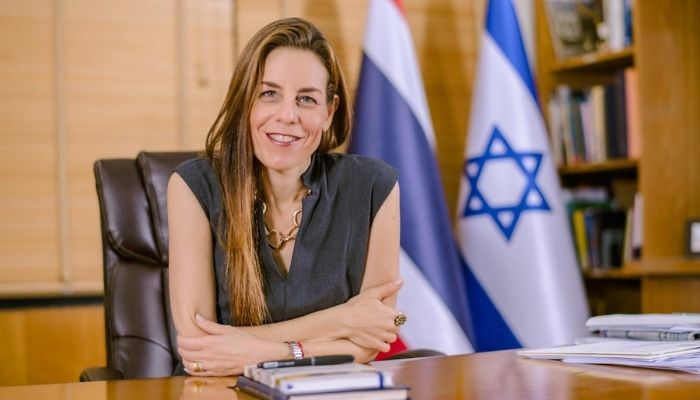Temporary chargé d’affaires Orna Sagiv says tourism and trade between the two nations are set to boom, writes Anucha Charoenpo of Bangkok Post
The Israel embassy to Thailand temporary chargé d’affaires, Orna Sagiv, is confident many fully vaccinated Israeli tourists will return to Thailand from Monday.
Israel is one of 63 countries and territories whose fully vaccinated nationals can enter Thailand without quarantine under the Thai government’s plan to stimulate the economy.
According to tourism surveys, Thailand is a popular tourism destination for Israeli citizens.
Ms Sagiv said that before the spread of Covid-19, roughly 200,000 Israeli tourists visited Thailand every year, and since the implementation of the Phuket sandbox programme, almost 7,000 Israelis have visited Thailand, second only to the number of tourists from the United States.
“I visited Thailand for the first time as a backpacker in 1990, and can understand why people love the ‘Land of Smiles’ so much,” she said.
“Many Israelis can’t wait to visit Thailand, and I am sure that from Nov 1, once vaccinated tourists are exempted from quarantine, they will return in large numbers.”
At the same time, Ms Sagiv said she hopes to see many Thais visiting Israel.
Though Israel is a small country, it is rich with history, culture, nature and amazing food.
Israelis love Thais and there are daily flights between our countries, which makes travelling much easier.
Cooperation strengthened
Besides the tourism exchange between the two countries, Ms Sagiv said bilateral relations between Israel and Thailand have grown stronger over the years.
Business and tourism are on the rise, the number of Thai workers in Israel is at an all-time high, and political relations are stronger than ever.
She said though the Covid pandemic has had a huge impact, now that the world is opening up, Israelis are looking to flock back to Thailand.
Firstly, Israel wants to arrange reciprocal visits of high-level delegations and high level bilateral dialogues in specific topics.
Secondly, Israel wants to sign a free trade agreement (FTA) with Thailand, which will ease business and increase trade and investment between the countries.
Thirdly, Israel wants to strengthen relations between academic institutions by enabling faculty exchanges, student exchanges and joint research.
Lastly, Israel wants to promote collaboration on innovation and knowledge sharing in areas relevant to both Israel and Thailand, such as food security, water management, agriculture and clean energy.
Ms Sagiv said that Israel, being a dry country, has developed unique expertise in water management: seawater desalination, waste water recycling, precise irrigation and accurate water measuring in every household.
“Israel and Thailand have been cooperating on water management and irrigation for many years now,” she said.
Israel has developed various collaborations including the training in Israel of numerous Thai experts, from different sectors such as agriculture and irrigation.
Several Israeli agricultural demonstration farms were established in Thailand over the years, often in partnership with local universities, where the use of Israeli technology is demonstrated in local conditions, she said.
About 80 Thai students travel to Israel every year for an 11-month training programme, which allows them to combine studies and fieldwork.
More students are expected to arrive in Israel, she said.
Safety for Thai workers
When it comes to the situation of Thai workers in Israel after a rocket attack killed two Thai workers in May, Ms Sagiv said her government has assured safety and fair treatment for Thai workers in Israel.
She said that in July last year, the Israeli and Thai governments signed an agreement to allow Thai workers to work in Israel.
The goal was to ensure the workers get fair treatment, and are well rewarded for their work.
The Israeli agriculture industry appreciates the Thai workers, and there are roughly 25,000 Thais living and working in Israel, some in the agriculture areas surrounding the Gaza strip, she said.
The rocket attacks, claimed by the Hamas terrorist group, were aimed at the civilian population.
She said the Israeli government does all it can to protect all civilians, whether they are Israeli citizens or foreigners.
Safe rooms are provided in buildings and open spaces that people can access easily once they hear the sirens.
Sadly, this time many did not make it in time to the safe rooms.
“In this respect, it is worth mentioning the protection offered to Thai workers in Israel in respect to Covid-19,” she said.
“All Thai workers were vaccinated with two doses of Pfizer — and the third one is in process — like every Israeli citizen.”
Economy vital
On trade, Ms Sagiv said trade between the two countries is approximately US$1 billion (33 billion baht) per year but the potential is much larger, as the two economies complement each other.
One example is the food industry, she said.
Thailand is a major global player in the food industry, while Israel has an up and coming food tech industry.
Many new innovations, such as protein and dairy substitutes, are developed in Israel, and can complement the Thai industry. Other areas in which the countries can deepen their collaboration are cyber security, health care, and telecoms, she said.
Regarding Thailand’s Eastern Economic Corridor (EEC), Ms Sagiv said the two countries have yet to reach a “startup agreement”. But there is a lot of interest and collaboration between companies and startups on both sides.
As for the EEC, her country tries to promote opportunities in the region for companies back home. Israeli companies have much to offer and Israel would like to see them involved in the EEC.
At the same time, Israel would be happy to see big Thai companies invest in Israeli startups and projects for the benefit of both sides.
People-to-people diplomacy
The Israel embassy recently initiated several projects to show the friendship which Israel feels towards Thais, she said.
Among these projects are a blood donation campaign, humanitarian help to the flood victims in Nakhon Ratchasima, and a scheme supporting a school for children with disabilities in Bangkok.



